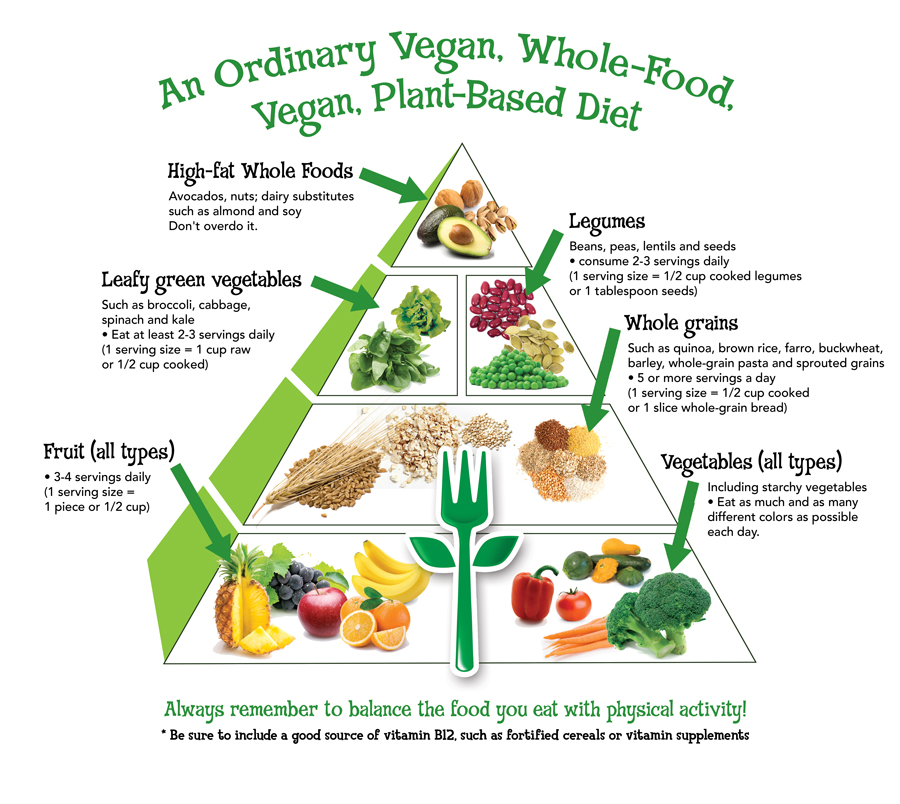Everything About Healthy Food: Advantages of Taking On Plant Based Choices
The discussion surrounding plant-based diets has obtained substantial interest in recent times. Lots of people are checking out the possible health advantages, nutritional advantages, and environmental effects connected with these dietary choices. As individuals come to be extra aware of their food's impact on wellness and sustainability, inquiries emerge about the usefulness of taking on such a way of life. What details changes can one anticipate, and how might these options improve not only individual health yet likewise the planet's future?
Understanding Plant-Based Diet Regimens
Several individuals associate plant-based diet regimens mostly with vegetarianism or veganism, these diet plans can include a vast variety of consuming patterns that prioritize entire, minimally processed plant foods. Such diet regimens commonly include fruits, vegetables, whole grains, legumes, nuts, and seeds, while removing or restricting animal items. This flexibility enables people to tailor their dietary selections according to personal preferences and nutritional demands. Some might embrace a primarily plant-based diet plan while still sometimes consuming meat or dairy, often referred to as a flexitarian approach. The focus remains on incorporating even more plant foods, which can bring about a diverse range of tastes and dishes. Recognizing these numerous interpretations of plant-based consuming is vital for valuing its ease of access and charm in contemporary food society.
Health Perks of Plant-Based Foods
The health and wellness advantages of plant-based foods are considerable, offering a nutrient density advantage that supports general wellness. Study shows that these foods can boost heart wellness and play an important function in reliable weight monitoring. By incorporating a lot more plant-based options, individuals may enhance their dietary options and promote long-lasting health.
Nutrient Density Benefit
Nutrient thickness plays an essential role in the health advantages of plant-based foods, making them a compelling selection for those looking for a well balanced diet regimen. Plant-based foods, such as fruits, vegetables, legumes, nuts, and whole grains, are frequently rich in important vitamins, minerals, and antioxidants while being reduced in calories. This high nutrient thickness enables individuals to take in less calories while still fulfilling their dietary demands. In addition, these foods are packed with dietary fiber, promoting digestive wellness and aiding in weight management. By integrating nutrient-dense plant-based choices, consumers can improve their total wellness, support their body immune systems, and decrease the threat of persistent diseases. Eventually, the nutrient density of plant-based foods underscores their significance in a health-conscious way of living.
Heart Wellness Enhancement

Weight Administration Support
Along with advertising heart health and wellness, a plant-based diet can substantially help in weight management. This nutritional technique emphasizes entire foods such as fruits, vegetables, beans, nuts, and entire grains, which are normally lower in calories and greater in fiber compared to animal-based products. The high fiber content assists boost satiety, lowering general calorie intake. Furthermore, plant-based diet regimens are typically abundant in vital nutrients while low in unhealthy fats, making it much easier to maintain a healthy weight. Plant Based Chicken. Study indicates that individuals who take on a plant-based lifestyle often tend to have lower body mass indexes (BMIs) and experience even more successful weight-loss contrasted to those that consume meat-heavy diets. Welcoming plant-based choices is a calculated choice for efficient weight administration.
Nutritional Value of Plant-Based Ingredients
Plant-based ingredients are abundant in necessary nutrients, using a diverse variety of vitamins, minerals, and antioxidants that add to general health and wellness. A contrast of healthy protein sources discloses that while pet items are often seen as superior, numerous plant-based choices offer sufficient protein and various other beneficial substances. Understanding the nutritional worth of these components can assist people make notified dietary choices.
Essential Nutrients in Plants
Nutrient-rich ingredients found in plants offer a varied variety of vital nutrients that contribute significantly to overall health. These ingredients are rich in vitamins A, C, and K, which support immune function, vision, and blood clotting, respectively. In addition, plants provide important minerals such as magnesium, calcium, and potassium, important for heart health and wellness, muscle mass function, and bone toughness. The existence of fiber in plant-based foods help food digestion and promotes a healthy and balanced gut microbiome. Anti-oxidants, discovered abundantly in vegetables and fruits, help fight oxidative anxiety and reduce swelling. Additionally, many plant foods are reduced in calories yet high in nutrients, making them an outstanding selection for those seeking to maintain a healthy and balanced weight while making certain perfect nutrient consumption.
Comparing Protein Sources
Protein sources vary significantly in their nutritional accounts, with plant-based active ingredients supplying one-of-a-kind benefits. Unlike pet proteins, which frequently contain hydrogenated fats and cholesterol, plant proteins tend to be reduced in these harmful elements. Legumes, nuts, seeds, and entire grains are rich in necessary amino acids, fiber, vitamins, and minerals. Lentils offer high protein web content together with substantial iron and folate, while quinoa is a total protein, providing all 9 vital amino acids. Additionally, plant-based healthy proteins are usually come with by anti-oxidants and phytochemicals that support total health. The shift to plant-based protein resources not only improves nutritional consumption however also straightens with sustainable dietary techniques, minimizing environmental influence and advertising lasting health advantages.
Environmental Effect of Plant-Based Eating
As understanding of climate modification expands, numerous people are exploring sustainable nutritional choices that can greatly minimize their ecological footprint. Plant-based eating has arised as a significant contributor to minimizing greenhouse gas exhausts, which are mostly related to livestock production. The growing of fruits, vegetables, grains, and beans normally calls for fewer sources, such as water and land, contrasted to animal farming. Furthermore, plant-based Gluten Free BBQ Sauce diet plans can bring about decreased deforestation, as less land is needed for grazing livestock or growing pet feed. By moving towards plant-based choices, consumers can support biodiversity and advertise much healthier communities. Overall, welcoming plant-based consuming not only advantages personal health but likewise stands for an important step towards ecological sustainability and preservation efforts.
Conquering Common Misconceptions
While many people recognize the advantages of a plant-based diet plan, several false impressions usually hinder them from totally embracing this lifestyle. A common idea is that plant-based diet regimens lack enough healthy protein; nonetheless, numerous plant resources, such as beans, nuts, and tofu, supply sufficient protein. Furthermore, some think that this diet regimen is costly, when actually, staples like beans, rice, and seasonal veggies can be fairly affordable. Another false impression is that plant-based eating is extremely limiting, whereas it really provides a varied range of flavors and foods. Finally, several worry that a plant-based diet regimen may lead to shortages, yet with appropriate planning, individuals can obtain all essential nutrients, including minerals and vitamins, while enjoying a wide range of tasty dishes.
Tips for Transitioning to a Plant-Based Way of life
Making the shift to a plant-based way of living can be an enhancing experience, though it frequently needs some support to navigate the first modifications. People are motivated to begin progressively, including even more fruits, vegetables, legumes, and entire grains right into their dishes while minimizing meat and milk consumption. Meal preparation is crucial; preparing an once a week food selection can assist reduce the change and prevent final harmful choices. Exploring cooking methods and new dishes can also improve the experience and keep enjoyment concerning plant-based consuming. In addition, signing up with support groups or neighborhoods can offer inspiration and share important suggestions. Remaining notified regarding nutrition warranties well balanced dishes, stopping shortages while promoting a healthy and balanced, enjoyable plant-based way of living.

Delicious Plant-Based Dish Ideas
Checking out delicious plant-based dish ideas can motivate individuals to accept an extra nourishing diet. One prominent choice is a passionate quinoa salad, featuring cherry tomatoes, cucumber, and a tangy lemon-tahini clothing. Another favorite is a full-flavored lentil stew, loaded with carrots, celery, and fragrant herbs, perfect for a reassuring supper. For breakfast, overnight oats made with almond milk, chia seeds, and topped with fresh berries give a healthy beginning to the day. In addition, a lively vegetable stir-fry with tofu and a selection of vibrant veggies can be a fast yet pleasing meal. Lastly, creamy avocado salute on whole-grain bread, sprayed with seeds and spices, supplies a straightforward yet delicious snack. These meals display the selection and splendor of plant-based consuming.

Frequently Asked Questions
Can a Plant-Based Diet Give Sufficient Healthy Protein?
The question of whether a plant-based diet regimen can offer sufficient protein prevails. Numerous resources, including beans, nuts, seeds, and whole grains, can fulfill protein requires efficiently, sustaining a well balanced and nourishing diet for people.
Are Plant-Based Diets Suitable for Kid?
The suitability of plant-based diet plans for youngsters depends upon cautious preparation. Appropriate nutrients must be ensured, consisting of healthy proteins, minerals, and vitamins. With correct guidance, such diet plans can support healthy development and development in kids.
Exactly how Do I Eat in restaurants on a Plant-Based Diet?
Dining out on a plant-based diet regimen includes seeking dining establishments with varied menus, asking for adjustments, and discovering vegan-friendly options. Preparation ahead and communicating nutritional choices can enhance the dining experience while keeping nutritional selections.
What Prevail Irritants in Plant-Based Foods?
Usual irritants in plant-based foods consist of soy, gluten, nuts, and seeds - Plant Based Chicken. People adhering to a plant-based diet regimen should know these allergens and review labels thoroughly to prevent damaging responses and assure secure consumption
Can Plant-Based Diets Assist With Weight Loss?
Research indicates that embracing a plant-based diet plan might assist in weight-loss due to its generally reduced calorie density and higher fiber content. This combination can enhance satiety, helping individuals manage their calorie consumption properly. Several individuals link plant-based diet plans mostly with vegetarianism or veganism, these diet plans can incorporate a vast variety of eating patterns that focus on whole, minimally processed plant foods. Nutrient density plays a crucial duty in the wellness advantages of plant-based foods, making them a compelling selection for those seeking a well balanced diet. Plant-based diet regimens have actually been revealed to significantly boost heart wellness, as they often include aspects that sustain cardio function. In enhancement to advertising heart health, a plant-based diet plan can substantially aid in weight administration. A typical idea is that plant-based diets lack adequate protein; however, various plant sources, such as beans, nuts, and tofu, offer ample protein.